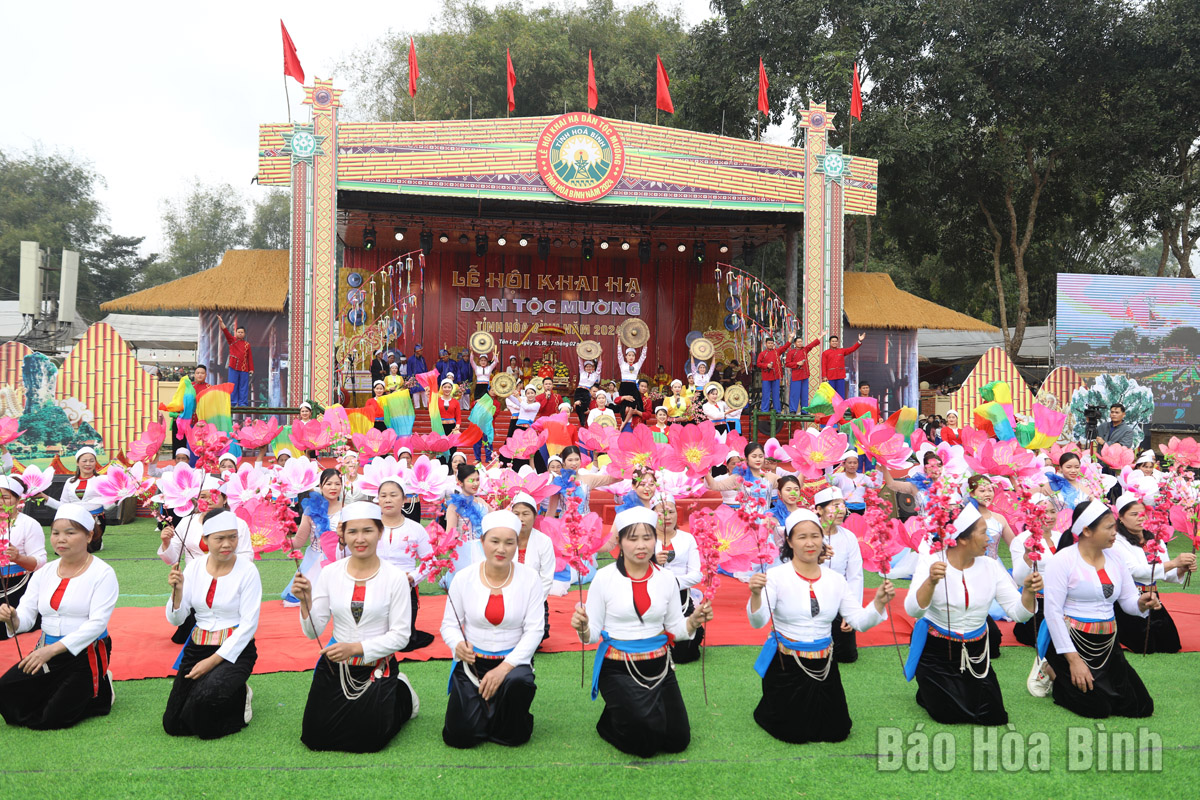
The Khai Ha Festival of Muong ethnic group in Hoa Binh province was held on a provincial scale from February 16 - 18 in Phong Phu commune, Tan Lac district.
A special musical performance at the opening ceremony of the festival.
At the opening ceremony, festival-goers took part in a palanquin procession and rituals, worshipping the gods of the land and heads of the village.
They also joined a mass gong performance, which featured the participation of more than 500 local artisans, a fashion show introducing Muong ethnic costumes, a fair displaying typical agricultural and tourism products, and various sporting events, such as tug of war, stick-pushing, and crossbow shooting.
Khai Ha Festival, also known as the ploughing or forest opening festival, has a connection with wet rice cultivation, which carries a sign of the civilisation of the ancient Vietnamese.
The event, the largest traditional festival in Hoa Binh, is an indispensable cultural practice of Muong ethnic people in the province every spring.
The Khai Ha festival of the Muong people in Tan Lac, Lac Son, Cao Phong, and Kim Boi districts was recognised as a national intangible cultural heritage.
With an increasingly vibrant and widespread emulation movement aimed at building cultured residential areas and cultured families, Yen Thuy District has been making steady progress toward improving both the material and spiritual well-being of its people, while fostering a civilized, prosperous, beautiful, and progressive community.
Once lacking recreational spaces and community facilities, Residential Group 2 in Quynh Lam Ward (Hoa Binh City) has recently received attention for the construction of a new, spacious, and fully equipped cultural house. The project followed the model of state support combined with public contributions in both labor and funding.
The "All people unite to build cultural life" movement, which has been effectively integrated with Kim Boi district’s socio-economic development goals, is fostering a lively spirit of emulation across local residential areas, hamlets, villages, public agencies, and enterprises. In addition, through the initiative, traditional cultural values are being preserved and promoted, while community solidarity and mutual support in poverty reduction and economic development are being strengthened.
A working delegation of the Hoa Binh provincial People’s Committee led by its Permanent Vice Chairman Nguyen Van Toan on June 11 inspected the progress of a project to build the Mo Muong Cultural Heritage Conservation Space linked to tourism services in Hop Phong commune, Cao Phong district.
Born and growing in the heroic land of Muong Dong, Dinh Thi Kieu Dung, a resident in Bo town of Kim Boi district, in her childhood was nurtured by the sweet lullabies of her grandmother and mother. These melodies deeply imprinted on her soul, becoming an inseparable part of her love for her ethnic group's culture. For over 20 years, this love for her hometown has driven Dung to research, collect, and pass down the cultural values of the Muong people to future generations.
In the final days of May, the Ethnic Art Troupe of Hoa Binh Province organized performances to serve the people in remote, mountainous, and particularly disadvantaged areas within the province. These were not just ordinary artistic shows, but they were the meaningful journeys aimed at spreading cultural values, enhancing the spiritual life of the people and contributing to the preservation of ethnic minority cultural identities.



